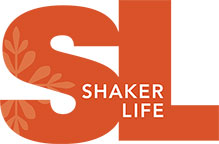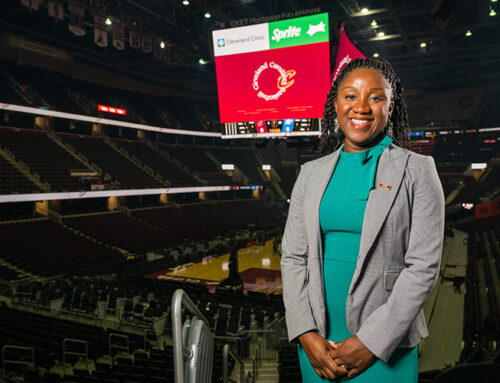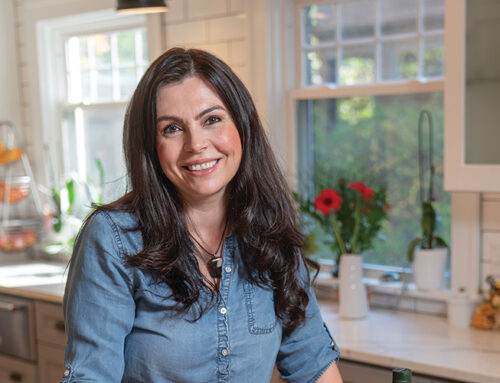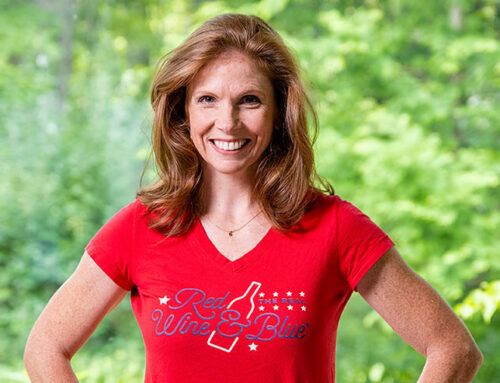With his new family-oriented book, the education director of the Rock Hall is trying to make listening to music a social experience again. So unplug those devices and dance!
By Sue Starrett
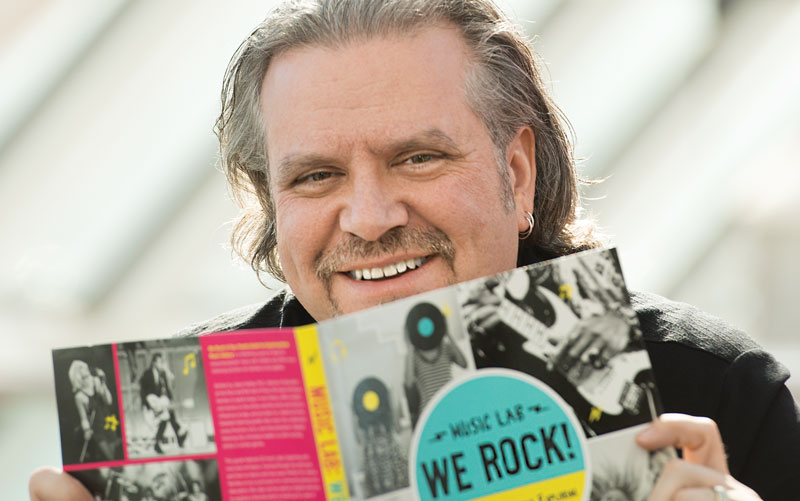
Doctor of musicology, father of four, musician, author, teacher, and Shaker resident — Jason Hanley is a very busy person.
Senior Director of Education at the Rock and Roll Hall of Fame and Museum since 2004 (and Interim Vice President of Education and Public Programs since August 2015), Hanley oversees K-12 and adult education, teaches on site and via distance learning, and produces the museum’s public programs.
Hanley has conducted oral histories and interviews with a variety of musicians, producers, and record industry professionals including Les Paul, Alan Parsons, and the rock band Yes. He has taught courses in music history, electronic music, and popular music studies at Hofstra University, Stony Brook University, Cleveland State University, and Case Western Reserve University. In addition, he has published articles in books and journals on popular music, film music, and music technology, and also has delivered papers at music professionals’ meetings. As a musician, Hanley has per¬formed on, composed for, and produced a number of recordings, as well as participated in many live concerts.
In January 2015, Jason Hanley’s book, We Rock! A Fun Family Guide for Exploring Rock Music History was published – thanks in part to a Shaker-made connection. It is organized by genre, from Rock and Roll through New Wave, and from Elvis through U2. Each chapter, or lab, highlights one musician and provides a listening guide for one song, as well as photos, playlists, and travel destinations. Family activities include dancing, watching Beatles movies, and dressing like a rock star. All the featured songs can be found on Spotify and Songza (under We Rock! Book).
How long have you lived in Shaker Heights, and what brought you and your family here?
We’ve been in Shaker for almost 12 years. When I was named to my position at the Rock Hall, I didn’t know anything about Cleveland. Some people suggested we look at Shaker Heights, and we quickly decided it was the right place for us. At the time Christine and I had two kids, and now we have four.
Who’s in your family?
Maisie is our oldest. She’s a senior at Shaker Heights High School, and plays cello in the chamber orchestra there; she went to Austria and Hungary with the orchestra and choir last spring. Next is Ella, who is at Shaker Middle School, plays viola, and has Down Syndrome. Hannah is in fifth grade at Woodbury and is a violinist, and our son Burke is two. Shaker is a great school system to be able to handle the wide spectrum of learning represented by our daughters.
I was born in Queens, New York, and my wife Christine is from Buffalo; she laughs at the snow here. She works for a Shaker neighbor, Nicole Gerami, whose speech pathology practice provides speech and language services for children.
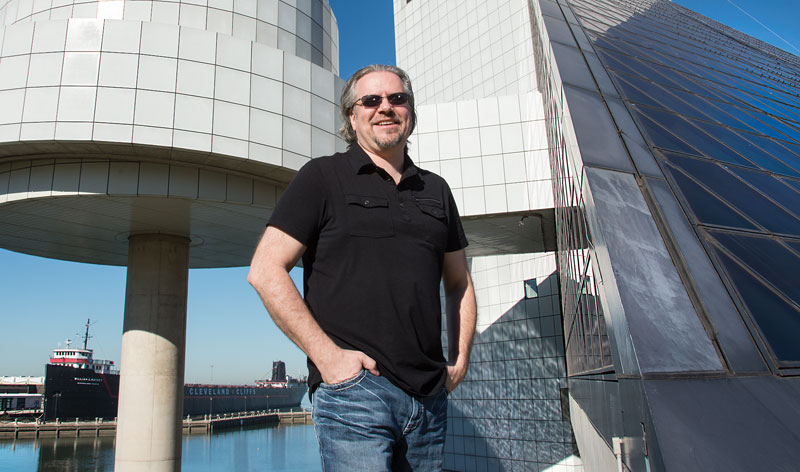
How did you become a music scholar?
Though I’d always played guitar and piano, when I started college I thought I’d go into computer science. Soon after attending the State University of New York in Albany, I realized I didn’t like programming on their VAX mainframe. A course in computer music made all the difference for me. I took more advanced courses and started working with musicians in downtown Albany.
After a while I enrolled in community college. When I decided on music as a major, I finished my undergrad, master’s, and Ph.D. degrees at Stony Brook University on Long Island. My Ph.D. is in musicology with a sub-emphasis in composition. (The title of Hanley’s dissertation is “Metal Machine Music: Technology, Noise, and Modernism in Industrial Music 1976-1996.”)
What kinds of music have you played?
I’ve been in punk, heavy metal, and industrial music bands. My dissertation is on electronics and 20th century avant-garde modernism. I don’t perform as much as I used to, though I’m in an education department band at work.
What are your responsibilities at the Rock Hall?
Every day I uphold our mission to engage, teach, and inspire. I’m always thinking about the history of rock and roll and how to teach it. If I didn’t have this job, I’d be talking about rock and roll on the street corner. I work with a range of learners, from toddlers to adults, and what I say about how rock and roll connects to history, science, etc. is diferent for each group. My staff and I design the classes, and I interview all the artists who come through the museum. I’m also executive producer for the Music Masters series the Rock Hall presents with CWRU each fall. And I worked on the 2015 Hall of Fame induction ceremony. I’m learning, too, and every day I ind something I hadn’t known before. I love my job.
How did you come to write a book for families?
My family and I were invited to a neighborhood Fat Tuesday party a couple of years ago, and I happened to start talking to Mary Ann Hall, a book editor who lives in Shaker. [Hall is the editorial director for Quarry Books and Rockport Publishers. Her company publishes high-end, visual inspiration, and reference books for artists, food enthusiasts, and sports fans, among many others.] She mentioned she wanted to work on something related to music. We met at Dewey’s to talk further, and that led to her pitching my idea to her publisher, who bought it. here are no other books like mine. It took about a year to write and another six months to edit.
With a colleague, I had published an article on the pedagogy of teaching rock and roll. While musicology is a rarefied language, people respond when complex ideas become approachable. I am always listening to and playing music with my kids; we really enjoy listening together.
How does your book work?
It’s organized into 52 labs, each of which is an activity. Every lab features an artist and includes a bio, a playlist, facts about the historical and social context of the music, and a listening guide for a particular song by that artist. In the appendix, I make connections between various songs introduced in the labs and suggest other listening options. I wrote the book in an approachable, conversational style, and it’s meant to be fun. he driving force of my book is families listening together to music. I’m trying to make music a social experience again, instead of a solitary time, plugged into a phone or other device.
What else do you do for fun?
I do a lot of music stuf for fun, and I’m lucky to earn a living by doing what I love and am passionate about. I also love the museums in University Circle and the Metroparks, and I’m a comic book fan (I don’t want to grow up).
Every Saturday I take my kids to the Shaker Library, partly to teach them the value of books and reading. Shaker’s diverse neighborhoods are wonderful, with many unique houses. I’m an architecture buf, so I went to the Shaker Historical Society to learn about the Van Sweringen brothers and their Garden City.
My older children love swimming, and we’re at Thornton in the summer. Our three daughters have been Shaker Sharks, and Maisie is on the swim team. My family and I love being part of Shaker, and I don’t even mind paying the taxes – as long as I can see the money being used to make a positive difference in our community.
